《英语短篇小说选读》讲义(第七周)
- 格式:ppt
- 大小:971.50 KB
- 文档页数:36
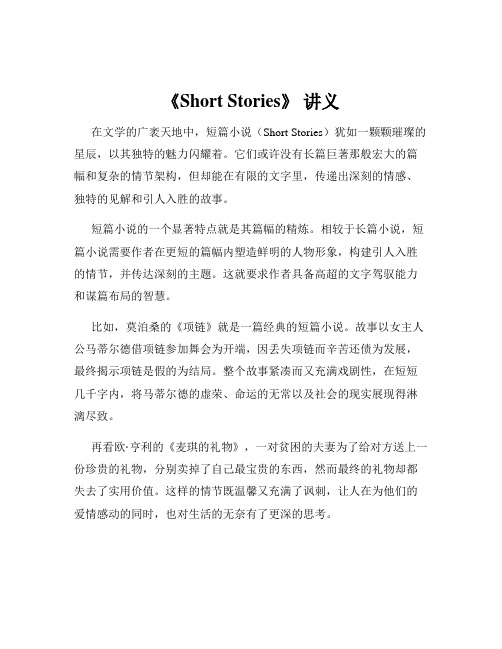
《Short Stories》讲义在文学的广袤天地中,短篇小说(Short Stories)犹如一颗颗璀璨的星辰,以其独特的魅力闪耀着。
它们或许没有长篇巨著那般宏大的篇幅和复杂的情节架构,但却能在有限的文字里,传递出深刻的情感、独特的见解和引人入胜的故事。
短篇小说的一个显著特点就是其篇幅的精炼。
相较于长篇小说,短篇小说需要作者在更短的篇幅内塑造鲜明的人物形象,构建引人入胜的情节,并传达深刻的主题。
这就要求作者具备高超的文字驾驭能力和谋篇布局的智慧。
比如,莫泊桑的《项链》就是一篇经典的短篇小说。
故事以女主人公马蒂尔德借项链参加舞会为开端,因丢失项链而辛苦还债为发展,最终揭示项链是假的为结局。
整个故事紧凑而又充满戏剧性,在短短几千字内,将马蒂尔德的虚荣、命运的无常以及社会的现实展现得淋漓尽致。
再看欧·亨利的《麦琪的礼物》,一对贫困的夫妻为了给对方送上一份珍贵的礼物,分别卖掉了自己最宝贵的东西,然而最终的礼物却都失去了实用价值。
这样的情节既温馨又充满了讽刺,让人在为他们的爱情感动的同时,也对生活的无奈有了更深的思考。
短篇小说的魅力还在于其情节的巧妙构思。
好的短篇小说往往能在开篇就迅速抓住读者的注意力,然后通过巧妙的情节转折和发展,让读者始终保持着紧张的阅读状态。
例如,芥川龙之介的《罗生门》,以一个破败的城门为背景,通过一个仆人的心理变化和选择,展现了人性的复杂和黑暗。
从一开始仆人的犹豫,到最后为了生存而放弃道德,每一个情节的推进都让人意想不到,却又在情理之中。
而在契诃夫的《变色龙》中,通过对警官奥楚蔑洛夫围绕一条狗的态度反复变化,将其见风使舵、趋炎附势的丑态刻画得入木三分,让人在捧腹大笑的同时,也对社会的丑恶现象有了深刻的认识。
短篇小说的人物塑造同样至关重要。
由于篇幅限制,作者无法像在长篇小说中那样对人物进行全方位的细致描绘,但却可以通过抓住人物的关键特征和典型行为,使人物形象鲜明而生动。
比如鲁迅的《孔乙己》,仅仅通过孔乙己站着喝酒却穿着长衫、“排出九文大钱”等几个典型的动作和细节,就将一个深受封建科举制度毒害的读书人的形象呈现在读者面前,让人对他的可怜与可悲感同身受。
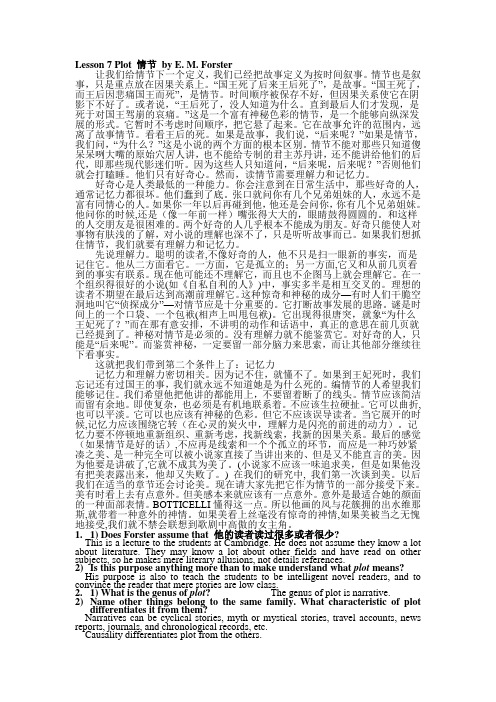
Lesson 7 Plot 情节by E. M. Forster让我们给情节下一个定义,我们已经把故事定义为按时间叙事。
情节也是叙事,只是重点放在因果关系上。
“国王死了后来王后死了”,是故事。
“国王死了,而王后因悲痛国王而死”,是情节。
时间顺序被保存不好,但因果关系使它在阴影下不好了。
或者说,“王后死了,没人知道为什么。
直到最后人们才发现,是死于对国王驾崩的哀痛。
”这是一个富有神秘色彩的情节,是一个能够向纵深发展的形式。
它暂时不考虑时间顺序,把它悬了起来。
它在故事允许的范围内,远离了故事情节。
看看王后的死。
如果是故事,我们说,“后来呢?”如果是情节,我们问,“为什么?”这是小说的两个方面的根本区别。
情节不能对那些只知道傻呆呆咧大嘴的原始穴居人讲,也不能给专制的君主苏丹讲,还不能讲给他们的后代,即那些现代影迷们听。
因为这些人只知道问,“后来呢,后来呢?”否则他们就会打瞌睡。
他们只有好奇心。
然而,读情节需要理解力和记忆力。
好奇心是人类最低的一种能力。
你会注意到在日常生活中,那些好奇的人,通常记忆力都很坏。
他们蠢到了底。
张口就问你有几个兄弟姐妹的人,永远不是富有同情心的人。
如果你一年以后再碰到他,他还是会问你,你有几个兄弟姐妹。
他问你的时候,还是(像一年前一样)嘴张得大大的,眼睛鼓得圆圆的。
和这样的人交朋友是很困难的。
两个好奇的人几乎根本不能成为朋友。
好奇只能使人对事物有肤浅的了解,对小说的理解也深不了,只是听听故事而已。
如果我们想抓住情节,我们就要有理解力和记忆力。
先说理解力。
聪明的读者,不像好奇的人,他不只是扫一眼新的事实,而是记住它。
他从二方面看它。
一方面,它是孤立的;另一方面,它又和从前几页看到的事实有联系。
现在他可能还不理解它,而且也不企图马上就会理解它。
在一个组织得很好的小说(如《自私自利的人》)中,事实多半是相互交叉的。
理想的读者不期望在最后达到高潮前理解它。
这种惊奇和神秘的成分—有时人们干脆空洞地叫它“侦探成分”—对情节应是十分重要的。

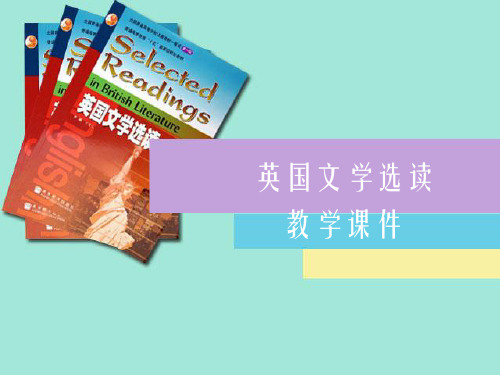
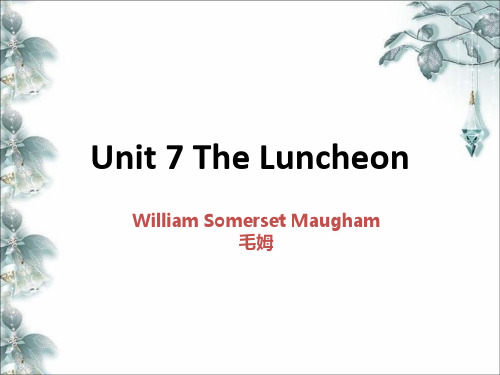

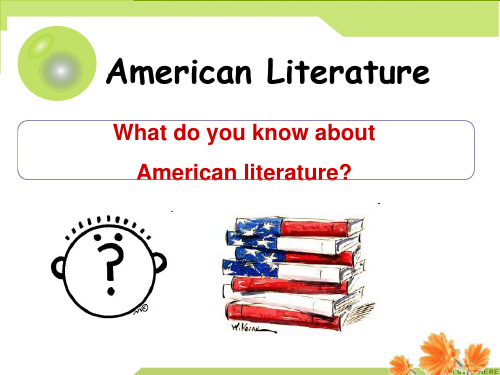
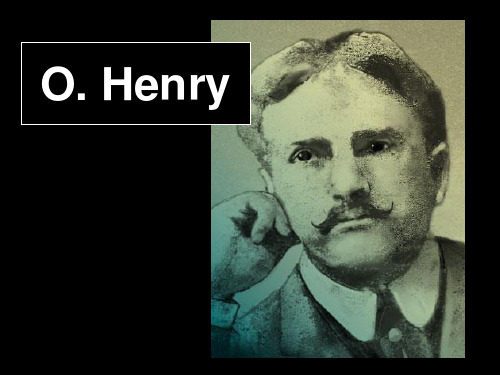
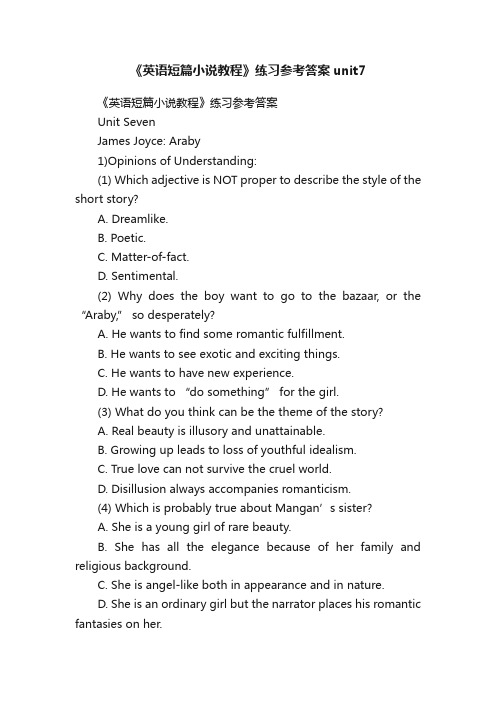
《英语短篇小说教程》练习参考答案unit7《英语短篇小说教程》练习参考答案Unit SevenJames Joyce: Araby1)Opinions of Understanding:(1) Which adjective is NOT proper to describe the style of the short story?A. Dreamlike.B. Poetic.C. Matter-of-fact.D. Sentimental.(2) Why does the boy want to go to the bazaar, or the “Araby,” so desperately?A. He wants to find some romantic fulfillment.B. He wants to see exotic and exciting things.C. He wants to have new experience.D. He wants to “do something” for the girl.(3) What do you think can be the theme of the story?A. Real beauty is illusory and unattainable.B. Growing up leads to loss of youthful idealism.C. True love can not survive the cruel world.D. Disillusion always accompanies romanticism.(4) Which is probably true about Mangan’s sister?A. She is a young girl of rare beauty.B. She has all the elegance because of her family and religious background.C. She is angel-like both in appearance and in nature.D. She is an ordinary girl but the narrator places his romantic fantasies on her.(5) The short story ends with the sentence: “Gazing up into the darkness I saw myself as a creature driven and derided by vanity; and my eyes burned with anguish and anger.” What possibly has the boy suddenly realized?A. He has been behaving foolishly.B. The girl does not deserve so much of his affection.C. His uncle and aunt are heartless people.D. True beauty can not be obtained at any cost.2) Questions for Discussion:(Suggested answers for reference)(1) Why does the boy isolate himself in his room reading books and why does he retreat into dreams of idealized love? Find the contrasts between his real life and the imagined perfection.The boy’s real life:1. The living place was musty, cold, damp and gloomy.2. The neighborhood was described as being “the most hostile to romance.” (line 50)3. The rigid religious life seems to deprive a boy’s pursuit for romance, so the protagonist resorted to imagination as his escape from the day-to-day existence.3. The protagonist’s Uncle and Aunt seem accustomed to living the kind of monotonous life.The boys imagined beauty and romance:1. “I had never spoken to her, except for a few casual words, and yet her name was like a summons to all my foolish blood.” (lines 48-49)2. “Her image accompanied me even in places the most hostile to romance.” (line 50)3. “I did not know whether I would ever speak to her or notor, if I spoke to her, how I could tell her of my confused adoration. But my body was like a harp and her words and gestures were like fingers running upon the wires.” (61-63)4. The girl was even nameless, being called Mangan’s sister, but she appears like an angel on earth.(2) Why is the journey to the bazaar so important to the boy? Has he taken the matter over-seriously?(The journey and the buying of something is not important in itself. What is important is the boy’s promise to Mangan’s sister. The boy regarded it as a sacred mission that he had to fulfill. It became a token of his youthful love and everything that was beautiful and ideal.)3) Explanation and Interpretation:(Identify what literary device the writer uses in each (or each pair) of the following expressions)(1) The other houses of the street, conscious of decent lives within them, gazed at one another with brown imperturbable faces. (personification)(2) a. The light … lit up the hand upon the railing.b. the lamplight (shone)… at the hand upon the railings…(symbol)(3) a. I kept her brown figure always in my eye…b. seeing nothing but the brown-clad figure cast by my imagination.. (symbol)(4) When we met in the street the houses had grown sombre. (personification)(5) Gazing up into the darkness I saw myself as a creature driven and derided by vanity.(epiphany)4) Suggested Homework:In the short conversation with Mangan’s sister, the boy promised to get something for her from the bazaar. The journey made him realize something, but a promise was still a promise though the girl might not take it seriously. Suppose you were the boy and wanted to explain and apologize for not being able to fulfill your promise. Now write a few lines on a piece of paper and try to slip the letter into her hand next time you meet her.For reference only:“I think I have to humbly apologize to you for being unable to do something that I have promised. I’m sure you remember that in our last short conversation I told you I would go to the Bazaar for you and buy you a gift. However, it was unfortunate that circumstances prevented me from doing this little service for you. Please don’t feel disappointed. I seriously promise I will get you something somehow, even just to prove that I am sincere. I’ll keep that promise, and you, in the hea rt of mine.Truly yours”。
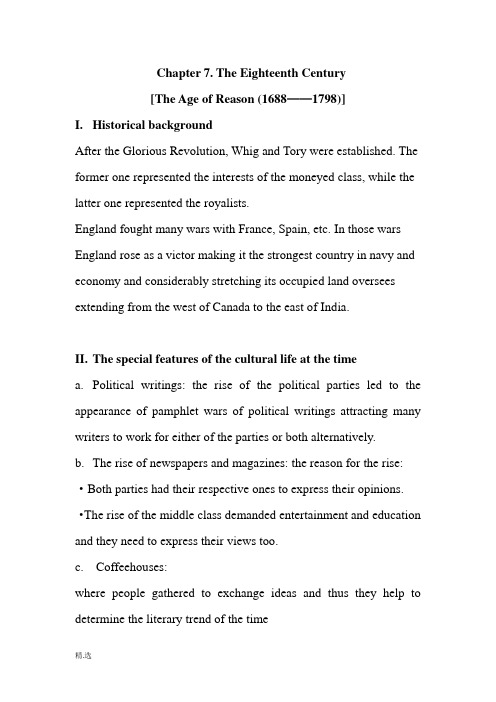
Chapter 7. The Eighteenth Century[The Age of Reason (1688——1798)]I. Historical backgroundAfter the Glorious Revolution, Whig and Tory were established. The former one represented the interests of the moneyed class, while the latter one represented the royalists.England fought many wars with France, Spain, etc. In those wars England rose as a victor making it the strongest country in navy and economy and considerably stretching its occupied land oversees extending from the west of Canada to the east of India.II. The special features of the cultural life at the timea. Political writings: the rise of the political parties led to the appearance of pamphlet wars of political writings attracting many writers to work for either of the parties or both alternatively.b. The rise of newspapers and magazines: the reason for the rise: ·Both parties had their respective ones to express their opinions. ·The rise of the middle class demanded entertainment and education and they need to express their views too.c. Coffeehouses:where people gathered to exchange ideas and thus they help to determine the literary trend of the timed. The new morality:·The emphasis on reason·The development of tolerance of different opinions in politics and religione. The influence of science and technology:·Principia Mathematica in 1687 by Newton (1642——1727) ·The new epistemology of John Locke (1632——1704)f. French influence——Augustanism——neoclassicism stressing to learn from the classicals*What is classicism?The characteristics in Greek and Roman classical works. They are clarity, logic, form, proportion, balance with each other, parallelism, restraint.III. The characteristics of neoclassicism1.Reason rather than emotion and form rather than content were emphasized.2.Most of the writings at the time were didactic and satirical.3.The closed couplet was the only possible verse form for serious work for elegance, correctness, appropriateness and restraint were preferred.4.It is exclusively a “town”poetry, catering to the interests of the“society”in great cities. The humbler aspect of life are neglected and it showed in most part no love of nature, landscape, or country things and peoplecking romantic elements and being hostile to medieval literature6.An age of prose, especially the latter part the centuryIV. Representative authors of the time1. Daniel Defoe2. Jonathan Swift3. Joseph Addison4. Alexander Pope5. Samuel Johnson6. Henry Fieldding7. Thomas Gray8. Thobias George Smollet9. Richard Brinsley Sheridan10. Robert Burns11. William Blake1.Daniel Defoe(1661—1731)a pioneer novelist of England and also a prolific writer of books and pamphlets on a great variety of subjects.1)his life story:a.from a dissenter’s family: Presbyterian butcherb.having a questionable character in politics, but strong belief in religious freedom2)his literary achievements:·fiction:Robinson , Crusoe , Moll Flanders·contribution to journalism & regulating English trade methods and principles3) characteristics of his fiction:a.Robinson Crusoe:(1)based on real experience of a Scottish sailor but combinedwith his own imagination, it is still a fictional work.(2)using the picaresque frame with a story in the shape of a journal and having strong sense of journalistic truth; containing serious wisdom of life(3)The importance of the hero:i. typical of the rising English bourgeois class, practical and diligent with a restless curiosity to know more about the world and a desire to prove individual power in the face of social and natural challengesIi. a real hero of middle class different from the hero of knights orepic hero(4)moral teaching: sing praise of labour, presenting it as the source of human pride and happiness as well as a means to change man’s living conditions from desperation to prosperity(5)limitations:i. praise colonization overseas through the relationship with Friday ii. his attitude to woman is open to criticismiii. Praise slaveryb. Moll Flanders:(1) its story(2)the significance, one is for the first a woman being the protagonist; artistically more mature than Robinson: better structure and better plot; so it is written in an autobiographical form called a memoir2. Jonathan Swift(1667-1745)a churchman and also a university graduate who viewed human society with contempt and has been called a cynic and even a misanthrope.1)his life story:His father died before he was born, and he had to accept the aid of his relatives and finished his study at Dublin University.2)his literary achievements:a.satirical essays:The Battle of Books(1696-1698), A Tale of the Tub(1696-1698)b.Writings in pamphlets:The Draiper’s Letters, A Modest Proposac.fiction:Gulliver’s Travel(1726)3)characteristics of his pamphlets:·Gulliver’s Travela. criticizing the oppression and exploitation of the Irish people by the absentee landlords and the English government.b. using bitter satire·The battle of Booksa debate happening 18th century. Some people modern people ·The Tale of the Tuba satire on various religious sects: Catholic, Anglican and dissenters’churches: changes done by different churches to the Christian doctrines·The Draiper’s Lettersrevealing the corruption and license, debased·A Modest Proposala satire on the English government’s heavy exploitation4)A Modest Proposala.It is a bitter satire on the policy of the English government towards the Irish people.b.Swift in this article suggested to the Irish people that the best way to end their misery was to produce children and sell them at market as a delicious dish for the rich.3. Joseph Addison(1672-1719)and Richard Steele(1672-1729)1) their life stories: they were born in the same year, attended the same school and later studied at the same university.they had the same political trend——whig2) their literary achievements:Joseph Addison & Richard Steele·Joseph Addisonstarted the periodical essays that were the most characteristic genre of 18thcentury literature.·Richard Steelecontribution to the periodicals:The Tatler, The Spectator, The Guardian3)characteristics of their periodical essays:a.Methods:d, indirect, was admirably adapted to their purpose.2. were full of wit, humor, and satire.b. Themes:dealt with1)light topics-fashions, head-dresses, practical jokes,2)polite conversations, discussed art, philosophy, drama, and poetry, and sought in so doing not only to interest the general reader in such subjects, but also to guide and develop their tastes.3) deeper topics such immoralityOne other characteristic: draw some images of some typical middle class people:C. Style: simple language familiar to the middle men; graceful, poised, well balanced, familiar words and expressions to the readers,4)Aims of their writing:a.to educate the newly risen middle class.b.to bridge the gap between the small circle of London elegance and wit,and the large, serious, rather Puritan middle class.5)two selected pieces written by Addisona. The Royal Exchangeb. Sir Roger at Church4.Alexander Pope(1688-1744)1) his life story:·he was self-educated.·he worked hard against poor health and unfavorable conditions and gained a profound knowledge of both the classics and the craft of writing.2)his literary achievements:·An Essay on Criticism, The Rape of the Lock, An Essay on Man ·Contribution to poetry in heroic couplets3)characteristics of his poems:a. succeeded Chaucer and Dryden in bringing metrical form to its perfection.b. contained a great number of quotable lines that have passed into everyday speech as popular sayings, such as :“To err is human, to forgive divine”, and “For fools rush in where angels fear to tread.”c. limitation: Pope is never profound in thought, so the poems lack original ideas5.Samuel Johnson(1709-1784)the greatest English man of letters between Pope and Wordsworth. 1) his life story:·he was born in a book seller’s family.·he was conservative in his world outlook and was against any kind of reform or innovation.·he upheld tradition and authority. Uphold conventions authority2)his literary achievements:·A Dictionary of the English Language·Contribution to a periodical, The Rambler,·Known for essay; his Preface to his edition of Shakespeare and The Lives of the Poets3)characteristics of his writing:Emphasizing the specification of language6. Henry Fielding(1707-1754)playwright, novelist and district law magistrate, came from an aristocratic background1) his life story:·was born to an upper-class family·began writing plays while at university and took it as his profession after leaving school.2)his literary achievements:novels:The History of the Adventures of Joseph Andrews,The History of Tom Jones3)characteristics of his novels:a. The History of the Adventures of Joseph Andrew( 1) its story and significance(2)in his preface to this novel Fielding proudly announced that he had created a new genre called comic epics in prose and discussed its characteristic feature.(3)the novel turned from a novel of seduction into one of the first exemplars of the great English panoramic tradition, which was to reach new heights later in Thackeray and Dickens.b. The History of Tom Jones(1) its story(2) Its significance:a. the understanding of allegory in the storyb. to Fielding, the countryside represents the basic goodness of human race, whereas the city stands for evil and sin.Tobias George SmollettA general introductionTobias George Smollett (19 March 1721 –17 September 1771) was a Scottish poet and author.He was best known for his picaresque novels, such as·The Adventures of Roderick Random (1748),·The Adventures of Peregrine Pickle (1751), which influenced later novelists such as Charles Dickens.·His last novel, the best novel is The Expedition of Humphry Clinker(1771), published in the year of his death.7. Thomas Gray(1716-1771)one of the representative poets at the time1) his life story:was born in London and educated at Eton and Cambridge, where he, after a grand tour on the continent, spent the rest of his life.2)characteristics of his poems:·more natural and spontaneous in thought·emphasizing emotions and sentiments3)The Elegy Written in a Country Churchyard8. Richard Brinsley Sheridan (1751-1816)1) his life story:was born in Dublin, of Irish origin, and was educated at Harrow.2)his literary achievements:drama: The Rivals, A Trip to Sarborough, The School for Scandal3)The School for Scandala. its story and significanceb. it is written in the tradition of Comedy of Manners, and exposes the immorality, hypocrisy, money-hunting, and scandal-mongering of the idle classes in 18th century England.9. Robert Burns(1759-1796)1) his life story:was born in Scotland in a poor peasant family and educated himself through selfstudy.2)his literary achievements:poems and songs3)characteristics of his poems and songsa.written in the Scottish dialect and in the tradition of Scottish folk songs.b.besides love lyrics, most of his poems and songs are about patriotic and political themes.10. William Blake (1757-1827)a poet as well as an engraver.1)his life story:was born in a hosier’s family in London and drew pictures and engraved to illustrate his works and the works of others.2)his literary achievements:·poems:Poetical Sketches, Songs of Innocence,Songs of Experience, Prophetic Books·broke with the neo-classical tradition both in form and in content3)characteristics of his poemsa. Songs of Innocence(1) expressed the poet’s delight in life,even in the face of sorrow and suffering.(2)the world is seen through the eyes of a child’s imagination which can be attained by adults if they cast away the follies and deceits of the hostile world and seek a visionary world through their imagination.b. Songs of Experience(1) the atmosphere is no longer sunny but sad and gloomy, and evil is found everywhere in this world.(2) through the loss of imagination, man has become a slave to the falsehood and hypocrisy of religion and society, and thus has lost the Heaven of Innocence and gained the Hell of Experience.c. the contradiction of these two poem collections。
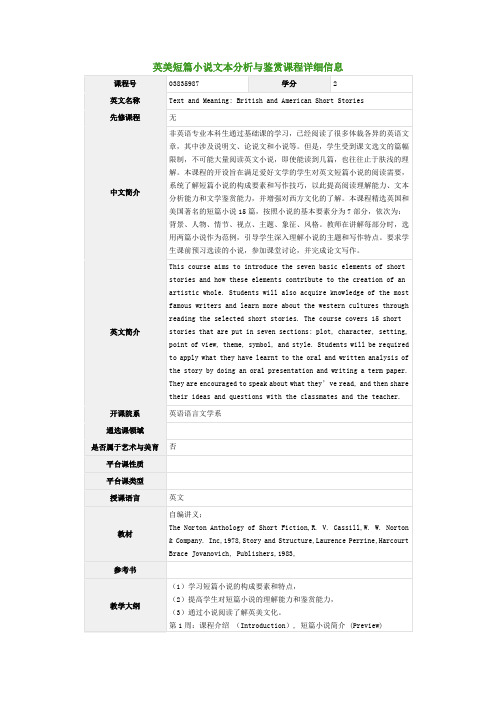
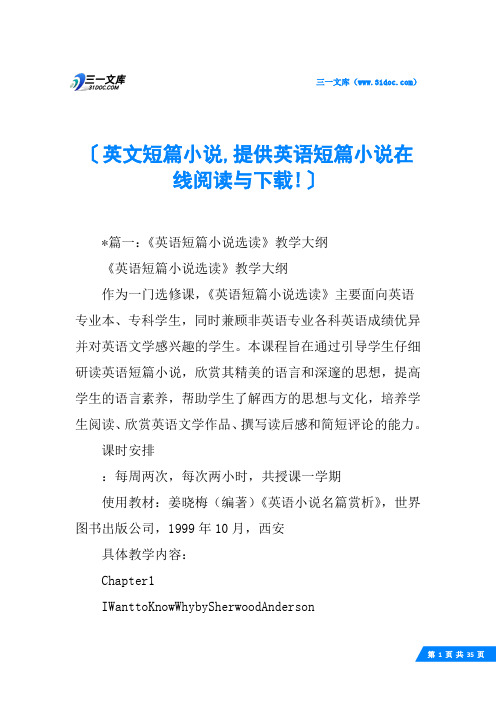
三一文库()〔英文短篇小说,提供英语短篇小说在线阅读与下载!〕*篇一:《英语短篇小说选读》教学大纲《英语短篇小说选读》教学大纲作为一门选修课,《英语短篇小说选读》主要面向英语专业本、专科学生,同时兼顾非英语专业各科英语成绩优异并对英语文学感兴趣的学生。
本课程旨在通过引导学生仔细研读英语短篇小说,欣赏其精美的语言和深邃的思想,提高学生的语言素养,帮助学生了解西方的思想与文化,培养学生阅读、欣赏英语文学作品、撰写读后感和简短评论的能力。
课时安排:每周两次,每次两小时,共授课一学期使用教材:姜晓梅(编著)《英语小说名篇赏析》,世界图书出版公司,1999年10月,西安具体教学内容:Chapter1IWanttoKnowWhybySherwoodAndersonChapter2TheDarlingbyAntonChekhovChapter3ARoseforEmilybyWilliamFauknerChapter4TheSnowsofKilimanjarobyErnestHemingwayChapter5TheCapandtheAnthembyO.HeyChapter6ArabybyJamseJoyceChapter7TheMagicBarrelbyBernardMalamudChapter8LifeofMaParkerbyKatherineMansfieldChapter9TheNecklacebyGuydeMaupassantChapter10TheStoryofanHourbyKateChopin参考书目:叶华年《英语短篇小说导读—结构与理解》,华东师范大学出版社,1999《英国短篇小说选》(上、下),上海译文出版社,1982王佐良,刘承沛《美国短篇小说选》,商务印书馆,1984 *篇二:外国短篇小说选读分惊异,瞪大眼珠子看守着。
不久,挂上暂停使用的牌子,忙着要把粪便挑走??终于到了傍黑时分,厕所租金达八贯之多,粪便挑走了五担。
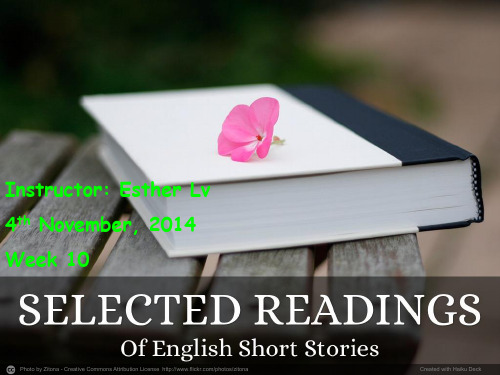

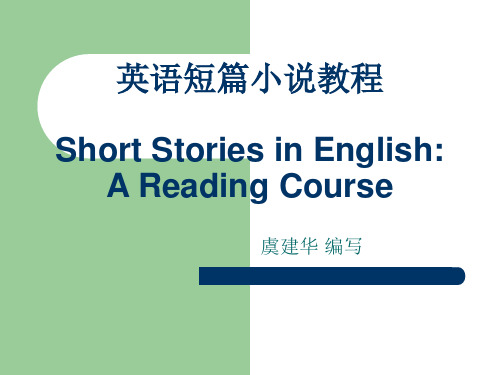
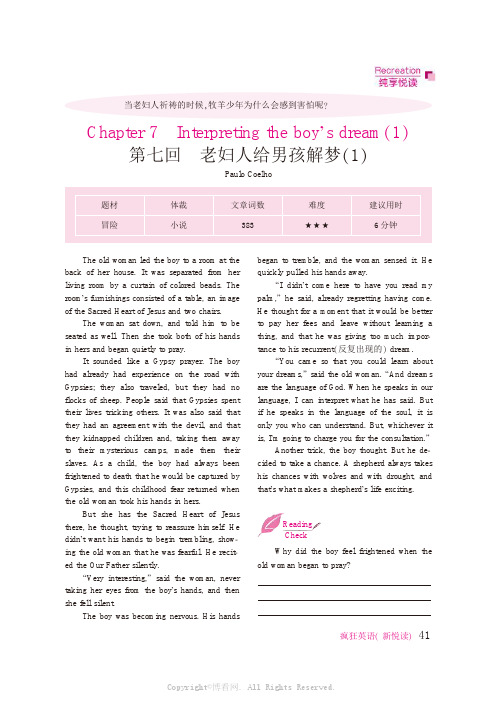
疯狂英语(新悦读)The ol d wom an l ed t he boy t o a r oom at t heback of her hous e.I t was s epar at ed f r om her l i vi ng r oom by a cur t ai n of col or ed beads .The r oom ’s f ur ni shi ngs cons i s t ed of a t abl e,an i m age oft he Sacr ed H ear tof J es us and t w o chai r s .The wom an sat down,and t ol d hi m t o be s eat ed as wel l .Then s he t ook bot h of hi s hands i n her s and began qui et l y t o pr ay.I t s ounded l i ke a G ypsy pr ayer .The boy had al r eady had exper i ence on t he r oad wi t h G yps i es ;t hey al s o t r avel ed,but t hey had no f l ocks of sheep.Peopl e s ai d t hat G yps i es s pent t hei r l i ves t r i cki ng ot her s .I t w as al so s ai d t hat t hey had an agr eem ent wi t h t he devi l ,and t hat t hey ki dnapped chi l dr en and,t aki ng t hem aw ay t o t hei r m ys t er i ous cam ps ,m ade t hem t hei r s l aves .A s a chi l d,t he boy had al w ays been f r i ght ened t o deat h t hathe woul d be capt ur ed by G yps i es ,and t hi s chi l dhood f ear r et ur ned when t he ol d wom an t ook hi s hands i n her s .But s he has t he Sacr ed H ear t of J es us t her e,he t hought ,t r yi ng t o r eas s ur e hi m s el f .H e di dn ’t want hi s hands t o begi n t r em bl i ng,show ⁃i ng t he ol d w om an t hat he was f ear f ul .H e r eci t ⁃ed t he O ur Fat her s i l ent l y.“V er y i nt er es t i ng,”s ai d t he w om an,never t aki ng her eyes f r om t he boy ’s hands ,and t hen s he f el lsi l ent .The boy was becom i ng ner vous.H i s handsbegan t o t r em bl e,and t he wom an s ensed i t .H equi ckl y pul l ed hi s hands away.“I di dn ’t com e her e t o have you r ead m y pal m ,”he s ai d,al r eady r egr et t i ng havi ng com e.H e t hought f or a m om ent t hat i t w oul d be bet t er t o pay her f ees and l eave wi t hout l ear ni ng a t hi ng,and t hat he was gi vi ng t oo m uch i m por ⁃t ance t o hi s r ecur r ent (反复出现的)dr eam.“Y ou cam e s o t hat you coul d l ear n about your dr eam s ,”sai d t he ol d wom an.“A nd dr eam s ar e t he l anguage of G od.W hen he s peaks i n our l anguage,I can i nt er pr et what he has s ai d.But i f he s peaks i n t he l anguage of t he soul ,i t i s onl y you who can under s t and.B ut ,whi chever i t i s ,I ’m goi ng t o char ge you f or t he cons ul t at i on.”A not her t r i ck,t he boy t hought .But he de ⁃ci ded t o t ake a chance.A s hepher d al w ays t akes hi s chances w i t h wol ves and wi t h dr ought ,and t hat ’s whatm akes a s hepher d ’s l i f e exci t i ng.R eadi ngCheckW hy di d t he boy f eel f r i ght ened w hen t he ol d wom an began t o pr ay?当老妇人祈祷的时候,牧羊少年为什么会感到害怕呢?C hapt er 7I nt er pr et i ng t he boy ’s dr eam (1)第七回老妇人给男孩解梦(1)Paul o C oel ho41Copyright©博看网. All Rights Reserved.。